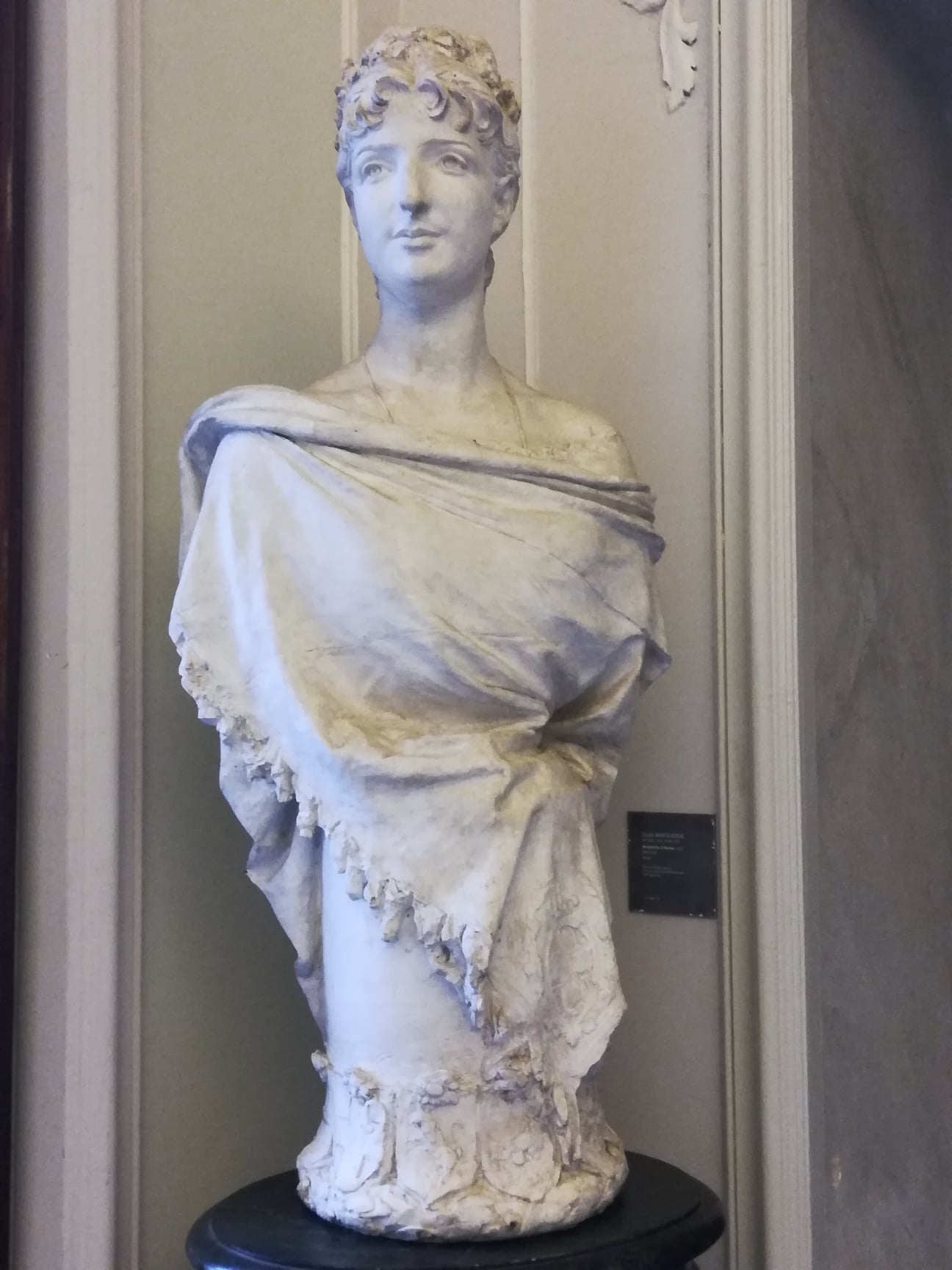
Click here to view image
Painting

Click here to view image
Painting


Click here to view image
Painting


Click here to view image
Painting

Click here to view image

Click here to view image
Objects


Click here to view image
Painting


Click here to view image
Sculpture


Click here to view image
Margherita di Savoia
Eredi Monteverde 1919 Genova
GAM0208
Unità di misura: cm; Altezza: 118.5; Larghezza: 60; Profondità: 34
The daughter of the Duke of Genoa Ferdinand of Savoy and Elisabeth of Saxony, Margherita Maria Teresa Giovanna (1851-1926) married at the age of seventeen her cousin Umberto, Prince of Piedmont, who in 1878 became King of Italy following the death of her father Victor Emmanuel II. The young woman, who lived in the Turin of the Risorgimento, assumed the role of the first Italian queen with brilliant and impeccable manners even during the most difficult events.
Margherita was portrayed by Monteverde in 1877. As she was sensitive to the arts and patroness of musicians and men of letters, including Giosuè Carducci, Margaret allowed the artist fifteen days to pose at the Villa Reale in Monza where he was a guest and, struck and amused by that "beautiful old man, with a Leonardo-esque head", portrayed him in turn. In those years Margherita had not yet become sovereign, but she was "the most intellectual of Queens", in Monteverde's own thoughts. The sculptor, author of monuments and portraits for public patrons and the Italian and foreign elite, was one of the official artists of the young Italian nation and received international recognition for the quality of his work.
A member of the Order of the Crown of Italy, in 1879 Monteverde received the title of Knight of the Civil Order of Savoy, reserved for men of letters and artists; in 1885, the year of his portrait to the king for the Senate, he was awarded the Order of Saints Maurice and Lazarus.


Click here to view image
New people
GAM 1611
Unità di misura: cm; Altezza: 300; Larghezza: 600
VIII Esposizione Internazionale Biennale d'Arte di Venezia - Venezia - 1909
Nomellini was a Tuscan painter influenced by the poetics of Symbolism and the technique of Divisionism. In fact, the painting is close to certain works by Gaetano Previati in terms of composition and narrative cut. Moreover, the use of the divided brushstroke that Nomellini shared with other Divisionists, including Giovanni Segantini and Angelo Morbelli, is clearly evident.
The overall tone of "Nuova Gente" is cold: it is dominated in quantity by the grey-blue tones of the sky and the ground. The brightest colours are the orange of the banner, that is found in the brushstrokes scattered in the work and in the flowers and grass leaves. The characters are backlit and thus coloured with dark complexions. The cloudy sky, on the other hand, is very light but not illuminated by sunlight.
The work develops horizontally and offers a wide view of the scene, depicting the human procession moving towards the observer's right. Men, women and children are naked and festive and advance amidst flowers and colours. In the centre two men carry a banner formed by a large wreath of flowers while at the head of the procession others hold a red banner that swells in the wind.
The painting was commissioned by the Municipality of Sampierdarena between 1907 and 1908, together with "Il Cantiere"(The Shipyard), for the decoration of the Sampierdarena Town Hall and exhibited in 1909 at the 8th International Biennial Art Exhibition in Venice: these two canvases are true manifestos of the industrial and shipbuilding vocation of the west of Genoa. "Nuova Gente" is part of the collection "Divisionism and Symbolism in Liguria". Rectangular canvas painted in oil and tempera


Click here to view image
Oil on canvas, 58 x 85 cm.




Headquarters:
Municipality of Genoa - Palazzo Tursi
Via Garibaldi 9 - 16124 Genoa
C.F / VAT 00856920102